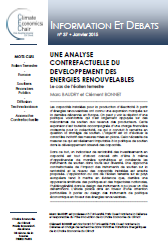
Comparing Biomass-based and conventional heating systems with costly CO2 emissions : heat cost emissions and CO2 breakeven prices
par Lilian Carpène, Vincent Bertrand, Timothée Ollivier
(disponible en Anglais uniquement)
This study investigates the full cost of heat for combustion technologies in a context of reducing CO2 emissions and increasing renewable energy consumption share in the European Union. The use of biomass in only-boilers or CHPs in both the industrial sector and in District Heat Systems may contribute to reach these European targets. This study aims to better understand the economics of heat production technologies. We attempt to determine the most profitable heat production technology given parameters such as the load factor and the carbon price level. This study proposes a method to find Carbon Switching Prices that correspond to carbon prices from which biomass technologies become more profitable than fossil fuelled technologies for the production of heat. Heat cost structures and thus Carbon Switching Prices (CSPs) are highly dependent on the load factor. Biomass technologies turn out to be high capital-intensive compared to fossil fuelled technologies so that the lower the load factor, the higher the CSP. Generally, gas technologies enjoy low fixed costs that enable them to be the most profitable technologies for low load factors. Without any CO2 price, biomass only boilers and CHPs are never competitive compared to fossil fuelled technologies. For low load factors (at 2500h), biomass boilers CSPs range between 80€/ton and 90€/ton whereas CHP CSPs are 40€/ton higher. However, for higher load factors (at 5000h), lower carbon prices (between 40 and 60€/ton) are needed to make profitable biomass technologies. Finally, the study shows that CSPs are very sensitive to biomass prices.
